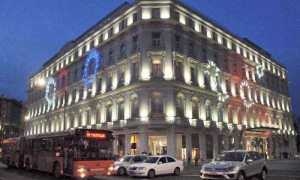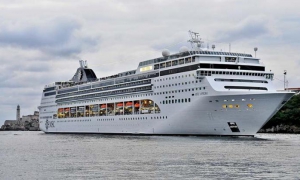
There is no need for the fuss of luxury hotels to enjoy a delightful tourist experience. In “these small things,” as Spanish musician Joan Manuel Serrat asserts, resides a unique yet silent charm.
Number 167, Colón Street in Santa Clara is therefore the ideal place for those who love natural, relaxed environments.
Like good hosts, Mirtha and Denis are waiting to receive me at the entrance of La Casona Jover. She is an economics graduate and he an architect; both experts in hospitality. Together they manage the house built in 1867 by one of the most illustrious families of Villa Clara, now popular with French, German and Swiss visitors, who normally stay for a short while, before heading off to other cities around the country.
One of the former owners also deserves a special mention. Astronomer Julio Jover Anido, whose family originated fromCatalonia, Spain, was the founder of the Patriotic Front in 1894 and owner of one of the first and most advanced observatories in Cuba.
Jover Anido, Mirtha’s great uncle, also collaborated with the Miami, Washington, and Puerto Rico Hurricane centers.
As Denis López puts it, “The house has a great charm. I am one of those people who believe buildings have a spirit, which is why there are places that you visit for the first time but you feel like you have known your whole life.”

However, the establishment is defined by its first-rate service, which saw the hostel awarded the Certificate of Excellence by TripAdvisor in 2014, and was recognized last year with the Quality Prize, presented to 25 establishments on the island, by the Hotel and Tourism Trade Union.
According to the co-proprietor, “Anyone can have a nice house, but not everyone provides excellent service. You have to focus on attention to detail, which is usually something very difficult to achieve. We have a staff of just over 10 workers, 70% of whom are professionals.”
Opened exactly eight years ago and now featuring a restaurant, the hostel’s first clients were two U.S. citizens. According to López, “They asked us for dinner and there was nothing in the freezer. I had to go out and get food from friends in order to prepare something for them. A little while later, we opened three rooms, the maximum allowed at that time. Then the law changed and we arrived at the five we currently have today.”
According to the business owner, a trip to Europe inspired the aesthetic design of their business, which is a colonial style house with a tavern feel, similar to what Italians call a “rustic-barn.”
The restaurant has been well received by clients, offering a range of dishes, noteworthy among which is the honey chicken whose recipe is given away to every diner.

“At the end of lunch, as a kind of surprise, we talk with visitors about the history of the house, the family etc,” notes López, while tourist agencies confirm that the establishment enjoys ample approval from clients.
Meanwhile, the business owner notes, “The honey chicken recipe was created due to my enthusiasm for experimenting in the kitchen. I learned how to cook a long time ago, because I didn’t like what my grandmother used to make me for lunch before going to university.” The dish even received an important distinction from a food guide representing a take on traditional Cuban culinary.
January 2016 saw the opening of La Casona Jover restaurant designed to cater to a limited number of guests - 20 diners sent by Agencia Celimar and Havanatur.
Denis López recalls that initially, “We were afraid that opening a restaurant would spoil the hostel’s calm, peaceful atmosphere, etc, but everything has been going well and we are expecting an increase in the number of U.S. guests. I have clients who have visited between three and five times, because here they feel right at home.”







